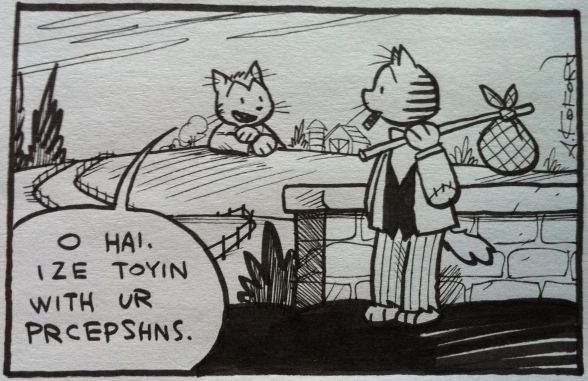The Best Short Stories of Ring Lardner, Lardner. Yes. On Dan Bern’s recommendation, I gave Mr Lardner a try. His frequent use of heavy dialect (I think it was one of his trademarks) was occasionally distracting and sometimes historically revealing (several not-especially-literate speakers said "w’ile", implying that at least some folks in the early 20th century distinguished between "w" and "wh"). The stories overall were well-written, and by and large held my interest.
Category Archives: Craig’s Book Reviews
Metamagical Themas Review
Metamagical Themas: Questing for the Essence of Mind and Pattern, Hofstadter. Non-fiction.
The Last Days Review
The Last Days, Westerfeld. Yes. This is nominally a sequel to Peeps, but I found it interesting to imagine reading it without having read Peeps. Each gives what could be premature insight into the events of the other, though, so perhaps the ideal situation would be to read each with no memory of the other.
Fragile Things Review
Fragile Things, Gaiman. Yes. Not all of the stories collected here are gems, but most of them are very good, and only one or two write checks that the effort Gaiman put into them does not cover.
The Book Thief Review
The Book Thief, Zusak. No. I didn’t hate I Am the Messenger, but I hated this. I gave up after the first chapter or so, and the chapters were very brief. It made me long for Mandy Patinkin. I think the lesson here may be that if you have a stunt premise, you need to go easy on the stunt writing style. Of course, easy on the stunt writing style is almost always the way to go, irrespective of your premise.
The Historian Review
The Historian, Kostova. Yes. I found very little to dislike about this book. I hear that lots of folks disliked it, and my librarian speculates that there may have been a reflexive "I don’t like genre fiction" effect. It’s enough to make me sympathize with Harlan Ellison’s quest to get his works out of the SF ghetto. Whatever aspects others may have disliked, my complaints are minor: there are multiple narrative time lines, some presented in epistolary form, and others related differently, but there is so comparatively little action on what one might think of as the main narrative line that I couldn’t help wondering whether some other structure might have been less jarring (and, yes, there are fine reasons for going with the epistolary tradition, and I surely can’t advocate the book being any longer, so maybe it was the best way to go). I was also distracted by "a historian" vs "an historian". I’m quite sure Kostova was consistent as to which characters said which, but I think she may have just made the Americans say "a" and the non-Americans "an". Given how long ago some of the action takes place, I would have expected even the Americans of the time to use "an". There’s also at least one section where Kostova renders dialect via non-standard spellings of words, and that pulled my head right out of the book every time. Complaints notwithstanding, I think Kostova did an admirable job with the material.
Flights Review
Flights, ed. Sarrantonio. No. It’s perhaps not entirely fair to dismiss the entire collection, but the first half convinced me that I would be better off skipping the second half. I had a bad feeling about the collection from the word "Extreme" in the subtitle, and this feeling was reinforced by the presence of a story written by the editor (I didn’t make it to Sarrantonio’s story, but his introductions did not inspire me to persevere). The "Extreme Visions" in the subtitle invites comparison with Dangerous Visions, a nearly 40-year-old collection. Flights is not worthy of the invitation.
The Demolished Man Review
The Demolished Man, Bester. Yes (classic). I was disappointed with some aspects of the work as a whole, but the writing was just fine. I do enjoy reading The Future As Imagined in the Fifties, and this was as charming in its presentation as any.
U.S.! Review
U.S.!, Bachelder. Yes. It’s possible I’m not bright or attentive enough to have caught everything Mr Bachelder was doing in this meta-polemic, but there was enough on the surface to entertain me and keep me reading, and anything additional he was doing did not distract me.
Isle of the Dead Review
Isle of the Dead, Zelazny. Yes. I’ve been afraid lately to re-read some of the favorites of my youth, fearing my increasing crankiness will render them unreadable. Isle of the Dead is one of the most idiosyncratic works Zelazny published, but I don’t hate it. It was written in 1969, and it shows its age, but the man was a great writer, and his penchant for writing works such as this one, This Immortal, and He Who Shapes does not obscure his gift. Now I’m wondering why I don’t want to put Lord of Light in the same category. Maybe I’ll read it again and find out.
